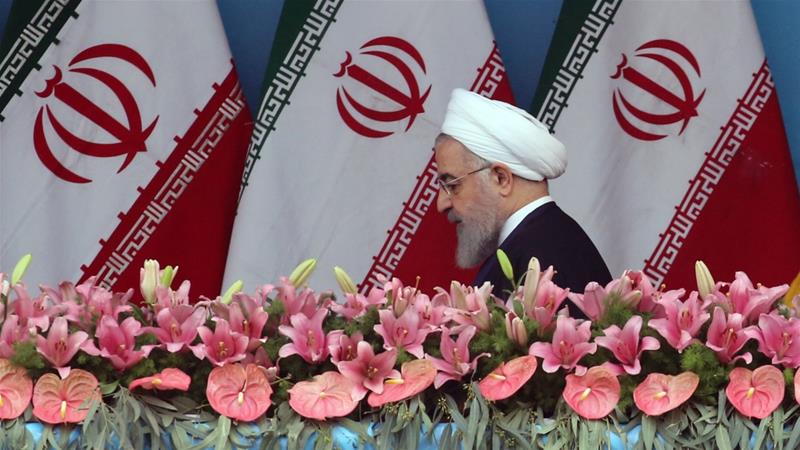Tanker carrying Iranian oil stopped off Spain's coast
Gibraltar says tanker transporting crude oil to Syria in breach of EU sanctions, as Spain says move made at US request.
British Royal Marines, police and customs agents in Gibraltar stopped a supertanker accused of carrying Iranian crude oil to Syria in breach of European Union sanctions.
The Grace 1 vessel was boarded early on Thursday when it slowed down in a designated area used by shipping agencies to ferry goods to ships in the UK territory along Spain’s southern coast.
Iran summoned the British ambassador in Tehran over the “illegal seizure” of the oil tanker in Gibraltar, Iranian state TV quoted foreign ministry spokesman Abbas Mousavi as saying.
John Bolton, White House national security adviser, applauded the interception of the supertanker.
“Excellent news: UK has detained the supertanker Grace I laden with Iranian oil bound for Syria in violation of EU sanctions,” Bolton said on Twitter.
The dramatic move could escalate the confrontation between the US and Iran.
While Europe has banned oil shipments to Syria since 2011, it had never seized a tanker at sea. Unlike the United States, Europe does not have broad sanctions against Iran.
“This is the first time that the EU has done something so public and so aggressive. I imagine it was also coordinated in some manner with the US given that NATO member forces have been involved,” said Matthew Oresman, a partner with law firm Pillsbury Winthrop Shaw Pittman who advises firms on sanctions.
“This is likely to have been meant as a signal to Syria and Iran – as well as the US – that Europe takes sanctions enforcement seriously and that the EU can also respond to Iranian brinkmanship related to ongoing nuclear negotiations.”
The Gibraltar government said it had reasonable grounds to believe the vessel was carrying its shipment of crude oil to the Banyas Refinery in Syria.
“That refinery is the property of an entity that is subject to European Union sanctions against Syria,” Gibraltar’s Chief Minister Fabian Picardo said.
“With my consent, our port and law enforcement agencies sought the assistance of the Royal Marines in carrying out this operation. We have detained the vessel and its cargo,” said Picardo.
Iran-US stand-off
Acting Spanish Foreign Minister Josep Borrell said Gibraltar detained the supertanker after a request by the United States.
The ship detention comes at a sensitive time as the European Union mulls how to respond to Iran announcing it will breach the maximum uranium enrichment level it agreed to in a landmark 2015 nuclear deal.
Iran did it in response to the United States abandoning the nuclear deal last year and hitting Iran’s crucial oil exports and financial transactions with biting sanctions.
In a statement, Britain’s foreign office said “we welcome this firm action by the Gibraltarian authorities, acting to enforce the EU Syria Sanctions regime”.
Spain was looking into the seizure of the ship and how it may affect Spanish sovereignty, as it appears to have happened in Spanish waters, Borrell said. Spain does not recognise the waters around Gibraltar as British.
Refinitiv Eikon mapping indicates the ship sailed from Iran, and if the cargo is confirmed to be Iranian crude, its attempted delivery to Syria could also be a violation of US sanctions on Iranian oil exports.
The mapping data shows the ship has sailed a longer route around the southern tip of Africa instead of via Egypt’s Suez Canal.
Confiscated oil
The Grace 1 was documented as loading oil in Iraq in December, although the Iraqi port did not list it as being in port and its tracking system was switched off. The tanker reappeared near Iran’s port of Bandar Assaluyeh fully loaded.
Shipping data shows the ship is a 300,000-tonne Panamanian-flagged tanker managed by Singapore-based IShips Management Pte Ltd.
According to Lloyds List, which analysed vessel-tracking data, the 1997-built ship is the first tanker laden with Iranian oil to head for Europe since late 2018.
Iran has accused the Trump administration of waging “economic war” against it with a campaign to reduce Iranian oil exports to zero, following the US pullout from a global nuclear deal.
Iranian crude exports were around 300,000 barrels per day or less in late June, industry sources said, a fraction of the more than 2.5 million bpd Iran shipped in April 2018, the month before US President Donald Trump withdrew from the nuclear deal.
The EU has imposed sanctions on 277 Syrian officials including government ministers over their role in the “violent repression” of civilians as the war broke out in March 2011.
It has frozen the assets of some 72 entities and introduced an embargo on Syrian oil, investment restrictions and a freeze on Syrian central bank assets within the EU.
Counting the Cost
How will Trump’s Iran oil gamble affect the global economy?
Source: Read Full Article




